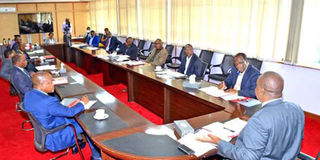Political power play disrupted as teams formed to lead pandemic war

Interior Cabinet Secretary Fred Matiang’i (right) addresses an inter-governmental meeting on response to Covid-19 at Harambee House in Nairobi on March 30, 2020. PHOTO | POOL | NATION MEDIA GROUP
What you need to know:
- Interior Cabinet Secretary Fred Matiang'i powers to appoint several ad-hoc committees, which are working behind the scenes to contain the crisis.
- Before the coronavirus gust disrupted the political stage and threw the politicos off-balance, Dr Matiang'i had become the dominant face of the administrative state.
As the coronavirus crisis deepens, President Uhuru Kenyatta appears to have used the opportunity to solidify the workings of the administrative state — having liquefied the political state for the last one year.
A look at who is who in the newly-formed National Co-ordination Committee on the Coronavirus Pandemic is an indicator of the people that the President hopes to rely on as the country goes through one of the worst health crisis in recent history.
Tracking coronavirus
With most of the politicians cut from the war against coronavirus, it is the government administration structure that has taken over, with regional commissioners being in charge at the county levels.
Internal documents indicate that President Kenyatta has given Interior Cabinet Secretary Fred Matiang'i powers to appoint several ad-hoc committees, which are working behind the scenes to contain the crisis.
Before the coronavirus gust disrupted the political stage and threw the politicos off-balance, Dr Matiang'i had become the dominant face of the administrative state — thanks to his position as the Interior CS and as the chairperson of the National Development Implementation and Communication Committee, whose mandate is to supervise the execution of government programmes.
Dr Matiang’i now has the mandate to chair the co-ordination committee on coronavirus. Health CS Mutahi Kagwe, Treasury's Ukur Yatani, Monica Juma (Defence), Peter Munya (Agriculture) and Joseph Mucheru (ICT and Youth Affairs) sit on the committee.
Others in this committee include Head of Public Service Joseph Kinyua, Attorney-General Kihara Kariuki, Chief of Defence Forces Gen Samson Mwathethe and National Intelligence Service Director General Major-General Philip Kameru.
Also sitting in the committee is Council of Governor Chairman Wycliffe Oparanya and Interior Principal Secretary Karanja Kibicho.
On Monday while making the decision by the National Security Council on strict movement into and within Nairobi, Kilifi, Kwale and Mombasa, it was apparent that Deputy President William Ruto, who ought to be a member of the council, was missing in action. He has not been included in any of the committees.
Again, the media briefings have been left to Mr Mutahi Kagwe, who is less confrontational with reporters and displays better command and control of the meetings.
At times, Mr Kagwe has been delegating the duty to the Chief Administrative Secretary Mercy Mwangangi with technical support from Dr Patrick Amoth, the director-general of Health.
Previously, the President had appointed a National Emergency Response Committee chaired by Mr Kagwe. It has now been expanded and in the new arrangement, Education CS George Magoha, a medical doctor, will now be sitting in this committee together with principal secretaries Belio Kipsang and Simon Wabukwesi.
Also brought in is Lt Gen Robert Kibochi, the vice-chief of the Defence Forces and Kang’ethe Thuku, the Principal Administrative Secretary in the Ministry of Interior.
The inclusion of the military in the arrangement means that the coronavirus pandemic is turning to be a national emergency.
Also established is the National Economic and Business Response working group, which is mobilising resources and conducting household impact assessment. Already, chiefs have been mobilised in various counties to list down the vulnerable members, with fear that the pandemic will take its toll on the poor and the elderly.
The economic team is chaired by National Treasury CS Ukur Yatani and has among its members Industrialisation CS Betty Maina, Adan Mohammed East African Community), Najib Balala (Tourism) and Central Bank Governor Patrick Njoroge.
The President seemed to indicate that the war on corruption would go hand in hand with the fight against the coronavirus by instructing Treasury to allocate the Sh2 billion recovered by the Asset Recovery to the vulnerable within the community.
“Our fight in this area continues,” said the President.
Besides disrupting the political power play, the pandemic will also leave a major gap in the coffers and might mean that President Kenyatta’s Big Four legacy will be in trouble.


